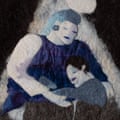It’s easy to see the initial part of Tindersticks’ career as a missed opportunity. There was a brief moment, around the time of their eponymous 1995 album and its successor Curtains, where it looked as if the Nottingham band’s lushly orchestrated, emotive songs might find a wide audience: the former briefly reached the Top 20, the latter propelled them to a major label deal. But they were doomed to remain a critically acclaimed cult concern, bigger in continental Europe than at home. They were a band that remained slightly out of step, too twilit and idiosyncratic for an era when British alternative rock tended to brash primary colours and singalong commerciality, their image too down-at-heel and their mood too downcast, their music more suited to soundtracking the demanding films of French director Claire Denis than the goal roundup on Match of the Day.

Yet there is a sense that cult status has served them well in their second act. Tindersticks reappeared in 2008 after a five-year hiatus and devoid of half of the original members. Most bands who reform, whether they would admit it or not, are in thrall to nostalgia and the expectations that come with it: their new material at best a fair forgery of old albums everyone knows, there to fill space in the setlist between the huge hits everyone has paid to hear. But the rejuvenated Tindersticks weren’t hemmed in by their own past or powered by the need to revisit former commercial glories. They’ve spent the last 16 years quietly pushing forward and making hugely impressive albums, their remarkable qualitative consistency spiked by the fact that they’re sure enough of their audience to throw them the occasional curveball, as on 2021’s Distractions: made remotely during lockdown, it dealt in samples, loops and bursts of noise and featured arrangements so sparse that the music behind frontman Stuart Staples’ voice occasionally seemed to be barely there at all.
Its follow-up couldn’t be more different. The music on Soft Tissue is understated and hushed enough to conjure the feeling that the whole thing was recorded somewhere dimly lit, in the small hours of the morning, but it also feels warm, satisfying, and in places, rooted in 70s soul: there’s a distinct Memphis flavour to the brass and electric piano of opener New World – and a hint of Timmy Thomas’s Why Can’t We Live Together about the drum machine that underpins it; strings somewhere between a Blaxploitation soundtrack and a dramatic disco arrangement on Don’t Walk, Run; a spare, hypnotic bassline moves Turned My Back along at a leisurely pace. Elsewhere, there’s a faint Latin-American influence to the rhythm of Nancy, in so far as it sounds like the “bossa nova” setting on a primitive drum machine, and an intriguing interplay between Staples’ Bryan Ferry-ish drawl and the more strident and straightforwardly soulful tone of his vocal foil Gina Foster.
The mood is often as lugubrious as ever. Nancy offers a plea for forgiveness that you somehow suspect will fall on closed ears; for all the string-laden glow of its arrangement, the passionate love that’s “in flames” on Always a Stranger appears to be unrequited. New World’s narrator bemoans “the shit that I was falling through”: the repeated chorus of “I won’t let my love become my weakness” sounds rousing until you notice how ambiguous the line is. But despondency isn’t the whole story. At the album’s centre lurks Falling, the Light, built around an impossibly pretty guitar figure and an odd clip-clopping rhythm, its lyrics alternately struck by the beauty of south London in the sunshine and awash with memories of wedding days and secrets shared. The closing Soon to Be April is dreamlike, possessed of a wonderful, lengthy instrumental coda, and finds genuine optimism in the passing of seasons. If the overall message seems to be about noticing beauty in small things as a bulwark against the ghastliness of 21st-century life, then it’s reflected in the album’s sound, which is abundant with lovely, subtle details: the shimmering keyboard buried deep within Don’t Walk, Run, the delicate smears of violin around Staples’ vocal on The Secret of Breathing.
There is a great deal to said for any band who can successfully imprint their identity on two albums as ostensibly unalike as Soft Tissue and its predecessor. Perhaps that’s a result of Tindersticks existing in their own world, untroubled by the vagaries of musical fashion, at one remove from everything else. It was ever thus: you struggle to find a contemporary artist to compare Tindersticks to in 2024, but then, it was hard to see where they fitted in 30 years ago. They seem content to inhabit a quiet space some distance away from the main action and understandably so: it’s a place that’s a pleasure to visit.
This week Alexis listened to
Nilüfer Yanya – Method Actor
The almost-title track from Yanya’s third great album in a row: itchily urgent electronic beats, and soft, preoccupied vocals, slashed through with grungy distorted guitar.
Source: theguardian.com





















